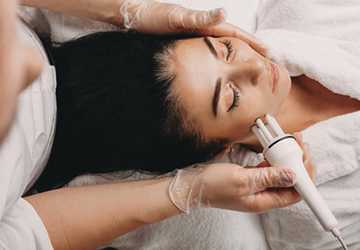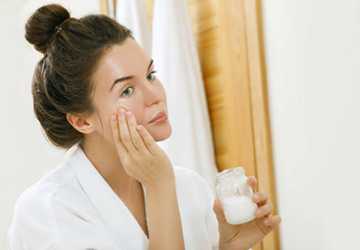Best Skincare Routines for Your 30s
Expert Tips: Dermatologist-Approved Anti-Aging Products
It's always a good idea to seek the advice of a skincare expert, especially in your 30s. Dermatologists often have extensive knowledge about the best anti-ageing products that are clinically proven effective. These products usually contain peptides, ceramides, and antioxidants designed to combat signs of ageing like wrinkles, hyperpigmentation, and loss of elasticity. A dermatologist can take the guesswork out of product selection by providing recommendations tailored to your skin type and specific concerns.

Lifestyle Modifications: Beyond Topical Treatments
While a good skincare routine is crucial for those in their 30s, lifestyle factors must be addressed. Regular exercise improves blood circulation and results in a more youthful appearance. Adequate sleep and hydration are also important factors, as a lack of both can cause the skin to look dull and exacerbate signs of ageing. Stress management techniques such as meditation or mindfulness can also significantly improve skin conditions. Your lifestyle choices are often reflected in your skin, which is why a holistic approach to skincare is so important.
Customize Your Routine: Seasonal Changes in Skin Care
An often overlooked aspect of skincare guidelines for your 30s is adjusting your routine to the seasons. In the winter, more vital moisturizers and more frequent use of hydrating masks may be needed. Conversely, summer may require lighter formulas and increased use of sunscreen products. Your skincare routine is not set in stone; it should adapt to your environmental influences and ensure optimal skin health year-round.
The Future of Skin Care: Innovative Technologies and Treatments
The skin care industry constantly evolves, with new technologies and treatments emerging. In your 30s, consider non-invasive procedures like laser treatments, chemical peels, or Botox injections to maintain a youthful appearance. Although these treatments may be effective, consulting a healthcare professional for personalized advice is essential. There are many possibilities ahead, and staying informed will help you make the best decision for the long-term health of your skin.
DIY Skin Care: Natural Remedies for Aging Gracefully
Many people in their 30s are turning to DIY skincare as an alternative to or in addition to commercial products. Natural ingredients like aloe vera, coconut oil, and various essential oils can provide a more organic way to fight the signs of ageing. These natural remedies can benefit sensitive skin that may not tolerate chemical solids well. However, before applying any homemade preparations to your face, test them first to ensure they are suitable for your skin type.
Beyond the face: Extend skincare to the neck and hands
While the face usually gets the most attention, the neck and hands are also prone to ageing and require a specific skincare routine for those in their 30s. Extending all steps of your skincare routine to your neck and even the décolletage is essential. Likewise, using a hand cream that contains SPF and anti-ageing ingredients can go a long way toward maintaining the youthful appearance of your hands.
Skin Care Routine for Age 30: Gender-Specific Needs
While the basics of good 30-year-old skin care guidelines are universal, men and women may have different skin care needs due to hormonal differences. For example, men may need a more effective cleanser to enlarge pores and increase sebum production. At the same time, women may be interested in products that provide hormonal balance, especially during pregnancy or the menstrual cycle. Gender-specific skin care lines are increasingly being developed to meet these specific needs.

Long-term planning: Invest in professional treatment
If you're in your 30s, consider a longer-term skin care strategy. Some people choose professional treatments like microdermabrasion or Ultrasound for longer-lasting results. Although these treatments can be expensive, they are generally considered a long-term investment in skin care. Before receiving professional skin care treatments, always talk to your doctor to ensure they are right.
The Importance of Consistency: Stick to a Routine
For those in their 30s, consistent skin care is vital. It may seem tempting to keep trying new products that promise miraculous results. However, skin care is not an overnight miracle but a journey. Constantly changing products can disrupt your skin's balance and lead to potential problems, such as irritation or breakouts. Once you find the best anti-ageing products for your skin type and needs, you must use them long-term. Its consistency helps your skin adapt and respond better to the product so you can reap its benefits.
Analyzing Ingredients: The Backbone of Effective Skin Care
Understanding its ingredients is one of the most overlooked yet crucial aspects of choosing skin care products. As you age over 30, selecting products with active ingredients that are actually good for your skin becomes increasingly important. Look for the best anti-ageing products that contain proven elements like retinol, hyaluronic acid, or vitamin C.
The need for sun protection: not just a summer issue
Most people associate sun protection with beach trips and sunny days, but sun protection is a year-round commitment, especially in your 30s. Ultraviolet rays from the sun can significantly accelerate the ageing process. So, adding a high-SPF sunscreen to your 30-second skincare routine is non-negotiable. Look for a broad-spectrum sunscreen that protects against UVA and UVB rays.
Personalize your skincare: There's no one-size-fits-all solution.
One of the most common misconceptions is that a skin care product that works wonders for one person will do the same for another. In your 30s, your skin needs become more individualized due to hormonal changes, lifestyle and even climate. Therefore, your skincare guide for your 30s should focus on personalization. Whether choosing the best anti-ageing product or determining how often you should exfoliate, it should be tailored to your skin's needs. You consult a dermatologist to get a customized skin care plan.